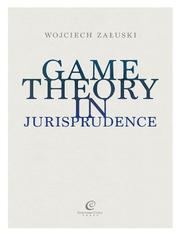Game Theory in Jurisprudence - Onepress

ISBN: 978-8-3788-6054-9
stron: 360, Format: ebook
Data wydania: 2014-02-24
Księgarnia: Onepress
Cena książki: 107,28 zł (poprzednio: 146,96 zł)
Oszczędzasz: 27% (-39,68 zł)
Game theory is a branch of mathematics which studies strategic interactions, i.e., interactions which involve more than one agent and in which each agent makes her decision while striving to predict the decisions of other agents. Game theory has been successfully applied in many areas of both the natural and social sciences, and it is the belief of this book’s author – Wojciech ZaĹ‚uski – that it can also be gainfully invoked in the area of legal philosophy. In this book, ZaĹ‚uski analyzes such legal-philosophical concepts as legal interpretation, justice, legal rights, contract, tort and property law through the lens of game theory. Since the book does not assume any previous knowledge of game theory, it appeals mainly to its conceptual rather than the technical side, and intertwines game-theoretical analysis with the philosophical, it will be accessible to a wider circle of readers interested in legal and moral philosophy.
Osoby które kupowały "Game Theory in Jurisprudence", wybierały także:
- English 4 IT. Praktyczny kurs j 49,67 zł, (14,90 zł -70%)
- Ucz si 9,67 zł, (2,90 zł -70%)
- Zyskaj angielski akcent. Kurs video. Trening wymowy 99,00 zł, (39,60 zł -60%)
- English 4 IT. Praktyczny kurs j 59,00 zł, (26,55 zł -55%)
- ASAP. Jak nauczyć się języka obcego tak szybko, jak to możliwe 34,15 zł, (15,71 zł -54%)
Spis treści
Game Theory in Jurisprudence eBook -- spis treści
Acknowledgements
Preface
PART I: INTRODUCTION TO GAME THEORY
Chapter 1. The basics of game theory
1. Twelve questions about game theory
2. What is game theory?
3. What are the branches of game theory?
4. What are the functions of game theory?
5. What is a game?
6. What assumptions does game theory make regarding players?
6.1. Instrumental rationality
6.2. Common knowledge of rationality
7. What does game theory assume about players’ knowledge?
8. How can games be presented?
9. What are the main types of games?
10. What are the basic solution concepts of non-cooperative game theory?
10.1. Dominance
10.2. Nash equilibrium
10.3. Rollback equilibrium
10.4. Subgame-perfect Nash equilibrium
10.5. Sequential equilibrium
10.6. Other refinements
10.7. The Minimax Theorem
11. What is cooperative game theory?
11.1. The core
11.2. The theory of stable sets – the NM-solution
12. What is bargaining theory?
12.1 The bargaining problem
12.2 The Nash solution
12.3 The Kalai-Smorodinsky solution
13. What is evolutionary game theory?
PART II: GAME THEORY AND GENERAL ISSUES IN JURISPRUDENCE
Chapter 2. The nature of law
1. Law as a means for solving collective action problems
2. A game-theoretic account of collective action problems
2.1. Non-iterated games
2.1.1. The first pure type of collective action problems: egoism as an obstacle for a collective action
2.1.1.1. The Prisoner’s Dilemma
2.1.1.2. The Chicken
2.1.2. The second pure type of collective action problems: coordination difficulties as the main obstacle for collective action
2.1.3. Mixed type of collective action problems
2.2. Iterated games
2.3. Contributions of evolutionary game theory to understanding collective action problems
3. Three interpretations of the account of law as a means for solving collective action problems
3.1. Three types of legal norms
3.2. Three interpretations of the phrase ‘Law is a means for solving collective action problems’
3.2.1. The normative interpretation
3.2.2. The functional interpretation
3.2.3. The historical interpretation
4. The problem of legal normativity
5. Concluding remarks
Chapter 3. Legal interpretation
1. The notion of legal interpretation
2. The semantic limits of legal interpretation
3. The criteria for selecting a proper meaning
3.1. Intentionalism
3.2. Non-intentionalism
4. The strategic reasons for failing to select a proper meaning
5. Concluding remarks
Chapter 4. Legal rights
1. Six questions about legal rights
2. Two ways of justifying rights
3.The nature of rights
4. The function of rights
5. The types of rights
6. The justification of inalienable right
7. The emergence of fundamental rights
8. Concluding remarks
Chapter 5. Justice
1. Game theory and philosophical problems related to the concept of justice
2. The circumstances of justice
3. Justice as mutual advantage or justice as impartiality?
3.1. Game theory as a tool for explicating the first level rule of justice as mutual advantage
3.2. Game theory as a tool for criticizing justice as mutual advantage
3.3. Game theory as a tool for justifying justice as mutual advantage
3.4. An evaluation of justice as mutual advantage
4. Justice as impartiality: utilitarian justice or Rawlsian justice?
5. Concluding remarks
PART III: GAME THEORY AND SPECIFIC ISSUES IN JURISPRUDENCE
Chapter 6. Contract law
1. The main problems of contract law
2. The foundational problem of contract law
3. Contract law and trust
4. Contracts modeled by repeated games
5. Contract law and cooperative game theory
6. Concluding remarks
Chapter 7. Tort law
1. Two theories of tort law
2. In search for a cost-effective regime of liability
3. Concluding remarks
Chapter 8. Property law
1. Two questions about property law
2. The origins of the institution of private property
3. The justification of the institution of private property
4. Concluding remarks
Epilogue: Law and Economics and the projects of the naturalization of law
1. Naturalization sensu stricto and naturalization sensu largo
2. A critique of strong naturalization
3. Naturalization sensu largo: American legal realism and psychological legal realism
4. Law and Economics and the naturalization of law
5. Summary
6. Case study: reductionist accounts of justice
6.1. Introductory remarks
6.2. The conceptual reduction
6.3. The genealogical reduction
6.4. The psychological reduction
6.5. Reductionist accounts of justice in Law and Economics
6.6. Concluding remarks
Appendix: Rationality and emotions
1. The vagueness of the concept of the ‘rationality of emotions’
2. Intrinsic rationality of emotions
2.1. Token emotions
2.2. Types of emotions
3. Instrumental rationality of emotions
4. Adaptive rationality of emotions
5. Summary





